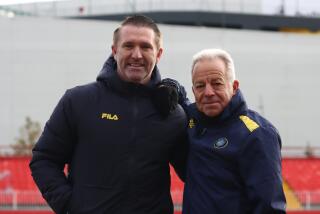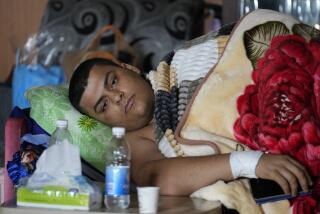In Iraq, Soccer Field Is No Longer a Refuge
- Share via
BAGHDAD — At the moment he jumped to head a ball during afternoon practice on the second-to-last day of March, Manar Mudhafar was one of the best soccer players on the best team in Baghdad, an easy-smiling 19-year-old with speed, skills and a toughness that made him a rising star.
By the time he hit the ground, he had a perplexed look on his face and a bullet in his throat. Mudhafar didn’t say a word as he struggled to breathe and blood soaked his white jersey, staining its Canon logo and his number, 29.
He was dead in three minutes.
“He looked like he had been stung by an insect,” recalled Haidar Mahmood, the captain of the Zawra team, who was standing beside his friend and teammate when he went down. “I got to him and I saw it was a bullet and I ran away, because I couldn’t stand seeing my buddy dying on the ground.”
It’s hard to hide from the rain of bombs and bullets that brings danger to the streets, the homes and even the mosques of Baghdad. But the bullet that killed Mudhafar invaded one place in Iraq that had been seen as a sanctuary: a soccer field, where the troubles of this splintering society could be left behind for the simple pleasure of kicking a ball around.
Mudhafar’s death, from what teammates accept was a stray bullet, possibly fired from a nearby police station, shattered that illusion of immunity, and brought a singular hurt to a city riddled with individual tragedies.
“Our club is like a family because we train together, travel together and play together,” said Mahmood, a 32-year-old veteran of Iraqi football, who once captained the national team under the Saddam Hussein regime. “Sectarianism is affecting everything in Iraq. But in football, it’s the opposite. There is no sectarianism. We are part of a team. Our soul is sport.”
A look at player rosters from teams across Iraq suggests that his words are more than just another sports cliche.
Sunnis play for the club in Najaf, a Shiite holy city, and Kurds play for the team in Samarra, a town in the heart of the Sunni Triangle. Irbil and Dahuk, the top clubs in Iraq’s heavily Kurdish north, have recruited Shiite players from the talent-rich neighborhood of Baghdad’s Sadr City.
Even Salahuddin, the local team for Hussein’s overwhelmingly Sunni hometown, Tikrit, has been signing Shiite players from the south.
“Sport does not know the sectarian voice or the political voice,” said Samarra coach Ayoub Younis, recalling the warm welcome his team received when it played this year in the mostly Shiite city of Nasiriya. “Football is the gathering point for the whole spectrum of Iraq, and the best example of that is our Samarra team that has Shia, Kurd and Sunni players, all born in Samarra.”
The same mix applies to Zawra, which has accumulated a host of championships since it was formed in 1969. The Baghdad club, once controlled by the Hussein family and its gangster associates, is now run by a group of former athletes who took it over after the war, when its facilities had been looted and it was left with nothing but the grass on the field. They are rebuilding in a time of little money, trying to keep sectarian politics at bay.
The team’s mix of Shiites, Kurds and Sunnis means they are not a target for attacks when they travel, said Abdel Rhaman Rashid, the club’s Kurdish manager. “We don’t take a guard when we travel, and there is not a gun among us,” he said.
This was the storied sports club Mudhafar joined when he was a kid, playing his way up through Zawra’s youth teams and onto Iraq’s national junior teams. Rashid had known him since Mudhafar was 12, and remembers “a shy and very polite kid” who quit school in his teens but who never coasted on his talent.
“Our club’s best players noticed how good he was when he was very young,” Rashid said. “We are very careful in who we choose: We don’t just take players off the street; we want players who are good people, too. Who will be loyal.”
Mudhafar’s parents divorced when he was young -- his mother remarried and moved to the United Arab Emirates -- and he lived with his grandfather. But Zawra was his real home, Rashid said. The club’s coaches were the ones who looked out for him, gave him money. “He was a son of the club.” The manager said he never thought to ask Mudhafar whether he was a Sunni or a Shiite.
“When he died, people were puzzled,” recalled a visibly shaken Rashid. “They said, ‘Where do we bury him? A Shia cemetery? Or Sunni?’ Until he died, no one knew what he was.”
*
Paeans to sectarian harmony notwithstanding, soccer is hardly a beacon for some fantasy future Iraq with its communities happily at peace. Players and executives agree that their sport is in deep trouble.
In this soccer-mad country, where fans follow European leagues on satellite TV and many will shell out more than $300 -- or about two months’ wages -- for a pay-TV subscription to watch next month’s World Cup, the domestic league suffers from the same ills that beset the rest of Iraq: poor security and lousy economics.
“It’s very hard to keep players in Iraq,” said Rashid, citing the widespread violence and low salaries that make it tempting to play abroad. Zawra’s players are paid $6,000 a year, good by Iraqi standards and higher than in most clubs, but a fraction of what teams in Qatar or Saudi Arabia can afford.
Soccer’s free-market economics are tough in a country that once survived on government funding. Emerging corporate sponsorship and television revenues can’t make up the shortfall in cash. Rashid said Iraqi TV paid only $300,000 for rights to broadcast the entire season, a sum that had to be divided among 28 teams. And low ticket prices in a country with rampant unemployment mean modest gate receipts.
Team officials say attendance has dipped from prewar levels, mostly because of security worries and dilapidated stadiums. With few fans willing to congregate in public places that present a target for bombers, Baghdad teams have been the worst affected -- Zawra is lucky to draw 5,000 in its 50,000-seat Shaab Stadium. Attendance is better outside the capital, with games in Basra or Irbil sometimes drawing 10,000.
The obstacles frustrate players and owners, who see themselves as underappreciated heroes of the new Iraq. They complain that while billions of reconstruction dollars wash through the economy, they must struggle to sustain one of the country’s few successful symbols of unity.
They are particularly bitter that the government failed to capitalize on the adrenaline kick for Iraqi national pride that came from the national soccer team’s surprise fourth-place finish in the 2004 Athens Olympics.
“The Olympics was an unbelievable achievement, but the government never cared for the players who raised the flag for Iraq,” said Zawra’s Mahmood, who was left off the Olympic side. “I was a professional in Qatar when the war ended, but I came back because I was so optimistic after the fall of the regime.
“I had so many plans,” he said. “Now I want to get out of this country.”
*
Manar Mudhafar also wanted to leave Iraq.
“He was looking for opportunities,” said Mahmood, who for nearly three years had driven the younger player to daily practice from their Baghdad neighborhood. Sitting in Mahmood’s 1999 Ford Crown Victoria, a status car in Iraq, they would talk about soccer and girls. On the last day of his life, they talked about the Korean car that Mudhafar was planning to import now that he was in Zawra’s starting lineup and had been picked for Iraq’s national team.
Mudhafar’s mother heard about her son’s death on a satellite TV channel. It was an accident, according to all but his distraught immediate family and a few conspiracy theorists on the Internet.
“Manar was moving, jumping when he got shot,” Mahmood said. “It would have been very hard [for a sniper] to hit him.”
The bullet probably came from the police headquarters adjacent to Zawra’s field, the team said. The station has been car bombed and mortar rounds are sometimes fired its way. Gunfire in the vicinity no longer turns heads.
At Mudhafar’s funeral, weeping fans placed his bloodied jersey over the spot where he fell. His teammates carried his body through his neighborhood, kids tagging along, then on to the Sunni cemetery for burial.
His death received national attention. Iraq’s sports channel aired a documentary in honor of the “martyr,” showing clips of Mudhafar playing soccer as a child.
Mudhafar is not the first Iraqi athlete to die violently. Teams have mourned players killed during the U.S.-led invasion or slain by kidnappers.
But Mudhafar’s talent gave him a chance to improve his odds. Two years ago, a team in the United Arab Emirates offered him a contract and dangled the prospect of Emirates citizenship if he would leave Iraq.
But he was not yet 18. And the Zawra club wouldn’t release him.
“The team wasn’t offering much money and it wouldn’t have been respectful to give up Iraqi citizenship,” Rashid said. “Manar wanted to go, but we refused.”
Besides, he said, there was more optimism back then, a belief that Iraq -- and Iraqi soccer -- was entering a better era.
“Maybe his family will come to us and say, ‘Why didn’t you let him go?’ ” Rashid said. “But we had plans for him. We wanted to give him a good future.”
The manager fingered photographs of the funeral, pointing out players carrying Mudhafar’s wooden coffin through the stadium where he died.
“We were his family,” he said. “We are the ones who lost him.”
Times staff writer Saif Rasheed contributed to this report.
More to Read
Sign up for Essential California
The most important California stories and recommendations in your inbox every morning.
You may occasionally receive promotional content from the Los Angeles Times.










